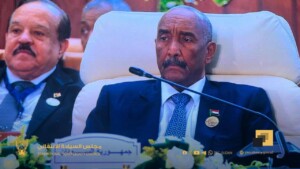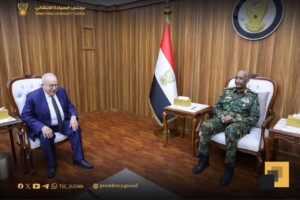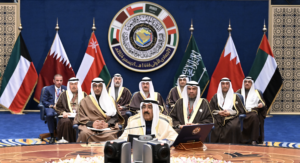Berlin talks between Sudan govt., SPLM-N broken off
The second informal meeting between delegations of the Sudanese government and the Sudan People’s Liberation Movement-North (SPLM-N) broke off on Saturday with no sign of progress toward an agreement ending the four years of conflict in South Kordofan and Blue Nile.
The second informal meeting between delegations of the Sudanese government and the Sudan People’s Liberation Movement-North (SPLM-N) broke off on Saturday with no sign of progress toward an agreement ending the four years of conflict in South Kordofan and Blue Nile.
The two delegations began their second informal discussions round in Berlin on Friday, with expectations that this session would conclude with agreements on the cessation of hostilities and the provision of humanitarian assistance. The accords would pave the way for a preparatory National Dialogue meeting. 
However on Saturday, the head of the government delegation, Presidential Assistant Ibrahim Mahmoud Hamid, issued a statement saying the SPLM-N delegation pulled back from its previous commitments to join the National Dialogue conference in Khartoum.
He further said the SPLM-N relinquished the principle of the unity of the national army, which was the basis of an agreement reached during the first informal meeting in Addis Ababa last December.
“The Government of Sudan regrets this position, which represents a setback from the previous understandings that established principles to achieve a comprehensive peace. Also, it frustrates the aspirations of the citizens of the Two Areas [Blue Nile and South Kordofan] and all people of Sudan.”
In a short statement released on Saturday, SPLM-N spokesman Mubarak Ardol commented that the government delegation refused all their propositions to reach a simultaneous cessation of hostilities in the Two Areas and Darfur, and to reach new political and security arrangements for South Kordofan and Blue Nile.
Ardol stressed the SPLM-N commitment to “key issues for the Sudanese people related to peace, food, freedoms, and citizenship, without discrimination”.
He added that the second round is the last in the informal talks.

In the middle, Anka Feldhusen of the German Embassy and Theodore Murphy, Bergman Foundation's Senior Coordinator of the Middle East & North Africa (source: Facebook of Yasir Arman)

Arman with Sudan's Presidential Assistant Ibrahim Mahmoud Hamid
Humanitarian aid
Last November, the tenth round of peace talks between Khartoum and the SPLM-N in Addis Ababa, brokered by the AU High-level Implementation Panel (AUHIP), reached a deadlock on the provision of humanitarian aid to the conflict-affected civilians in the Two Areas.
The rebel movement demands humanitarian aid to the needy in the rebel controlled areas in South Kordofan and Blue Nile to be transported through South Sudan and Ethiopia, while Khartoum insists on aid provision via Sudanese territory only.
The Sudanese government keeps to its stance that relief operations are to be controlled by the Humanitarian Aid Commission (HAC). According to the SPLM-N this government agency is infiltrated by agents of the National Intelligence and Security Service (NISS).
After the failure of the official negotiations in November, the AUHIP mediators decided to invite the two parties for informal talks in Addis Ababa from 16 to 18 December. Both delegations called the meeting “fruitful”. The informal setting provided an opportunity for the parties to speak frankly with each other and to better understand; their positions, they said.
The AUHIP and the German government agreed on a strategic partnership in their efforts to help ending the wars, and achieve a democratic transition in Sudan.
(Sudan Tribune, Sudan Vision Daily)











 and then
and then